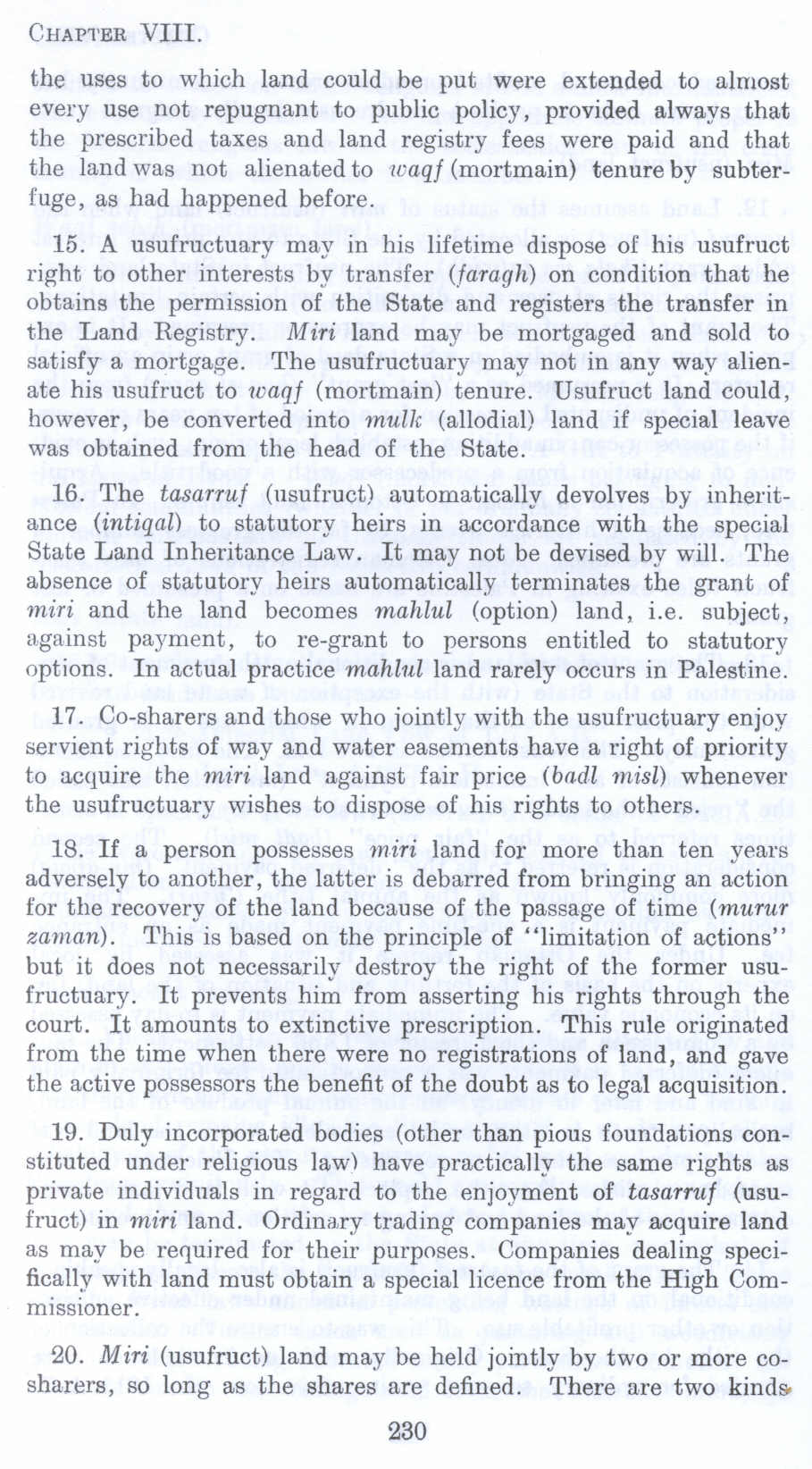| Prev | Next |  |
| Prev | Next |
| PalestineRemembered | About Us | Oral History | العربية | |
| Pictures | Zionist FAQs | Haavara | Maps | |
| Search |
| Camps |
| Districts |
| Acre |
| Baysan |
| Beersheba |
| Bethlehem |
| Gaza |
| Haifa |
| Hebron |
| Jaffa |
| Jericho |
| Jerusalem |
| Jinin |
| Nablus |
| Nazareth |
| Ramallah |
| al-Ramla |
| Safad |
| Tiberias |
| Tulkarm |
| Donate |
| Contact |
| Profile |
| Videos |
British Mandate: A Survey of Palestine: Volume I - Page 230 |
Disclaimer
The above documents, article, interviews, movies, podcasts, or stories reflects solely the research and opinions of its authors. PalestineRemembered.com makes its best effort to validate its contents.


Post Your Comment
*It should be NOTED that your email address won't be shared, and all communications between members will be routed via the website's mail server.
the uses to which land could be put were extended to almost every use not repugnant to public policy, provided always that the prescribed taxes and land registry fees were paid and that the land was not alienated to waqf (mortmain) tenure by subterfuge, as had happened before.
15. A usufructuary may in his lifetime dispose of his usufruct right to other interests by transfer (faragh) on condition that he obtains the permission of the State and registers the transfer in the Land Registry. Miri land may be mortgaged and sold to satisfy a mortgage. The usufructuary may not in any way alienate his usufruct to waqf (mortmain) tenure. Usufruct land could, however, be converted into mulk: (allodial) land if special leave was obtained from the head of the State.
16. The tasarruf (nsufruct) automatically devolves by inheritance (intiqal) to statutory heirs in accordance with the special State Land Inheritance Law. It may not be devised by will. The absence of statutory heirs automatically terminates the grant of miri and the land becomes mahlul (option) land, i.e. subject, against payment, to re-grant to persons entitled to statutory options. In actual practice mahlul land rarely occurs in Palestine.
17. Co-sharers and those who jointly with the usufructuary enjoy servient rights of way and water easements have a right of priority to acquire the miri land against fair price (badl misl) whenever the usufructuary wishes to dispose of his rights to others.
18. If a person possesses miri land for more than ten years adversely to another, the latter is debarred from bringing an action for the recovery of the land because of the passage of time (murur zaman). This is based on the principle of "limitation of actions" but it does not necessarily destroy the right of the former usufructuary. It prevents him from asserting his rights through the court. It amounts to extinctive prescription. This rule originated from the time when there were no registrations of land, and gave the active possessors the benefit of the doubt as to legal acquisition.
19. Duly incorporated bodies (other than pious foundations constituted under religious law) have practically the same rights as private individuals in regard to the enjoyment of tasarruf (usufruct) in miri land. Ordinary trading companies may acquire land as may be required for their purposes. Companies dealing specifically with land must obtain a special licence from the High Commissioner.
20. Miri (usufruct) land may be held jointly by two or more cosharers, so long as the shares are defined. There are two kinds.
Page 230